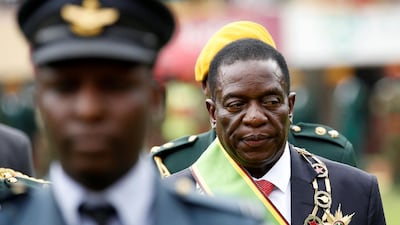The stone lookout that marked the grave of Cecil Rhodes, the imperialist overlord who once inspired the name of the country, was just a few miles away.
In the safari lodge lounge, a dispossessed white farmer was looking back at decades spent cultivating the fertile soil outside Bulawayo. He had recently been evicted by the war veterans set on the rampage by the former president Robert Mugabe.
The farmer was staying at the resort with his middle-aged son and daughter. One was a banker in London. The other was a doctor in England’s home counties.
Setting aside nostalgia, they both admitted they would not have returned had the old man retired of his own volition. Zimbabwe's land problem was generational.
Zimbabwe’s tragedy is that politics trumped economics in managing the historic shift from white domination to black. Mr Mugabe was a complicated character with a flawed faith in Marxist-Leninism running through his political core.
The vanguard that he unleashed in the late 1990s deposed him last week after another bout of economic ruin. The war veterans reacted against a corrupt clique whose ambitions were centred on Mr Mugabe’s much younger wife Grace. The so-called Generation 40 could not disguise their greed with a guerrilla record.
The accession of Emmerson Mnangagwa is thus more than a mere change of face. It is a reset of where power lies within Zimbabwe. Mr Mnangagwa was the steward of the war veterans. At the heart of the old guard, he benefitted handsomely from the seizure of the white-owned properties. But he pre-empted a takeover by Mrs Mugabe's cronies. He will now have the opportunity to reorient the economy.
The challenge for Zimbabwe can no longer be defined in terms of black and white.
The Look East policy succeeded in drawing some funds from Beijing but did not make up for what was lost.
An analysis from Chatham House noted last week the Chinese presence in Zimbabwe is strategically significant. Zimbabwean power brokers are fully integrated into Beijing’s network in the country.
Chinese investment in Zimbabwe has not been productive. The problem is not just capital investments but also a dearth of intellectual assets, entrepreneurial talent and managerial skills.
Land is the key to Zimbabwe. Reclaiming the country’s status as the bread basket of southern Africa is the obvious goal for any government. In the right circumstances, the country would be a magnet for global agricultural businesses and sovereign wealth funds.
The toxic legacy of Mr Mugabe is set to cast a long shadow. If his 75-year-old successor is truly keen to turn the page, some dramatic gestures are needed to demonstrate good faith.
Recovering the vast sums looted by corruption would be one such move. Rolling out the red carpet to foreign investors, not just the Chinese, should now be an imperative for Harare.
Suspicions based on colonial mistrust must finally be consigned to history. Harnessing the expertise of the diaspora that fled to Europe and elsewhere makes pragmatic sense.
The Zimbabwean farmers who were not too old to start again ended up farming in neighbouring countries. Some travelled as far away as Ukraine and Russia. Yet more emigrated to Australia. Many are keen to return to the land that was so good to them.
Attracting both investors and the skilled diaspora is impossible without free and fair elections next year. Unfortunately, state-sponsored violence and rigged elections were Mr Mnangagwa’s portfolio as Mr Mugabe clung to power in 2008 and 2013.
Opposition MPs such as Bulawayo’s Eddie Cross have, however, expressed their hope that the political system will be reformed by the new president.
There must also be an opportunity to restore the rule of law. One feature of Mr Mugabe’s rule is that the magistrates and some of the senior judges continued to rule impartially. Bringing back a respectable system of justice would be a massive boon.
Again optimists must hope that Mr Mnangagwa's past is not a guide to the future. The man known as the Crocodile orchestrated the Matebeleland massacres in the 1980s that killed 10,000 people.
Having been sworn in as president after a military intervention, Mr Mnangagwa needs international backing and a flicker of economic investment to show a departure from Mr Mugabe but also from his own past.
The best hope is that he will serve as a transitional figure to a new system that unleashes more of Zimbabwe's development potential.
The country’s virtuous circle is old men retiring in peace, exiles returning after lucrative careers abroad and well-educated youths finding jobs to fulfil their potential.

